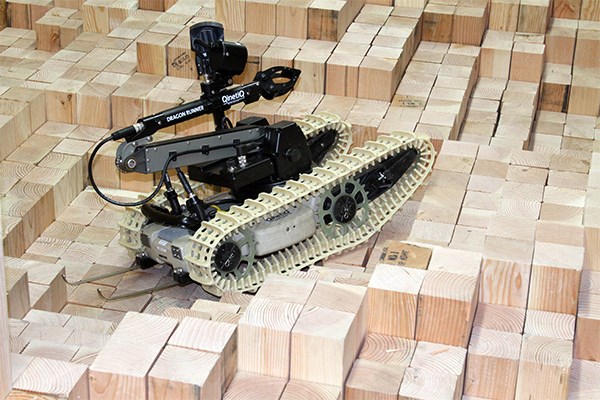More than $1M Awarded to Professor for Cutting-Edge Projects

The QinetiQ Dragon Runner reconnaissance robot, which assists at disaster scenes, completes an obstacle course at the university’s New England Robotics Validation and Experimentation (NERVE) Center. Photo credit: Joson Images for UMass Lowell
08/11/2015
Contacts: Nancy Cicco, 978-934-4944 or Nancy_Cicco@uml.eduLOWELL, Mass. – Google, the National Science Foundation and the National Institute for Standards and Technology have awarded more than $1 million to a UMass Lowell professor who is advancing the use of robotics to save lives, enhance workplace productivity and improve personal mobility.
The grants will support four research projects led by UMass Lowell Computer Science Prof. Holly Yanco, founder of the university’s Robotics Lab and director of the New England Robotics Validation and Experimentation (NERVE) Center at UMass Lowell. One of the country’s most advanced robotics testing facilities, the center evaluates the strength, durability, design and functionality of robots being developed by researchers and companies. Yanco’s work at the center and beyond is helping to fuel a more than $1.9 billion robotics industry in Massachusetts alone.
For more than a decade, robots have played an increasing role in evaluating disaster sites, including in the aftermath of the World Trade Center attacks on Sept. 11, 2001, Hurricane Katrina in 2005 and the malfunction of the Fukushima Daiichi Power Station in Japan in 2011. With support from Google, Yanco and her team are improving the way first responders communicate with each other and robots during such emergencies. The project will equip them with the company’s Google Glass devices and Project Tango-enabled laptops, giving them the video-display and sensor technology they will need to create three-dimensional site maps that can be transmitted in real time to authorities monitoring events such as search-and-rescue missions, bomb threats and environmental disasters.
“Once you have a detailed 3-D map of the site, you can develop a way of looking through walls during search-and-rescue operations and predicting the kind of structures you will likely encounter behind a wall or door,” Yanco said. “Our goal is to improve emergency response through more effective information sharing and augmented visualizations.”
Google has provided more than $50,000 to the year-long project. Assisting Yanco in her work is Carlos Ibarra-Lopez, a UMass Lowell graduate student in computer science who lives in Lowell. The project also incorporates the research of a robotics systems designer who aided in the rescue efforts at the World Trade Center and went on to earn a doctoral degree in computer science at UMass Lowell.
Police, bomb squads and other first responders will also benefit from another of Yanco’s projects, through which she will develop international training standards to teach emergency personnel how to master the use of robots. The project will receive more than $280,000 from the National Institute for Standards and Technology (NIST) over three years.
Evaluating the durability and performance of robots is another of Yanco’s efforts funded by NIST. The two-year project, supported by a $181,000 grant, will test the safety of using automated guided vehicles in a variety of manufacturing and service environments alongside employees, as more of these machines are performing routine work in production plants, warehouses and order-fulfillment centers. Adam Norton, the NERVE Center’s manager and a UMass Lowell graduate who lives in Lowell, is assisting Yanco with both NIST-supported projects.
The National Science Foundation has awarded Yanco a $553,607 grant to develop assistive technology for people with physical challenges. Through her collaboration with Northeastern University Prof. Robert Platt Jr. and individuals served by the Crotched Mountain Rehabilitation Center in Greenfield, N.H., she is working to create and test a robotic arm that may be mounted on a motorized wheelchair or scooter, enabling users to easily retrieve objects. Assisting Yanco is Abraham Shultz, a UMass Lowell doctoral student in computer science who lives in Littleton. The technology also has the potential to be used by military and law-enforcement personnel, astronauts and oceanographers, among others.
UMass Lowell is a national research university located on a high-energy campus in the heart of a global community. The university offers its more than 17,000 students bachelor’s, master’s and doctoral degrees in business, education, engineering, fine arts, health, humanities, sciences and social sciences. UMass Lowell delivers high-quality educational programs, vigorous hands-on learning and personal attention from leading faculty and staff, all of which prepare graduates to be ready for work, for life and for all the world offers. www.uml.edu
